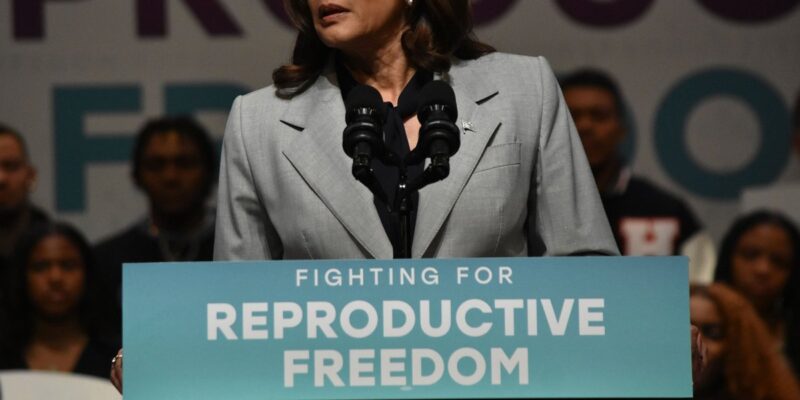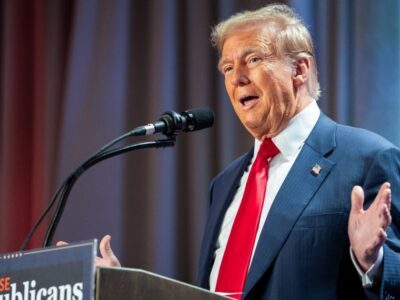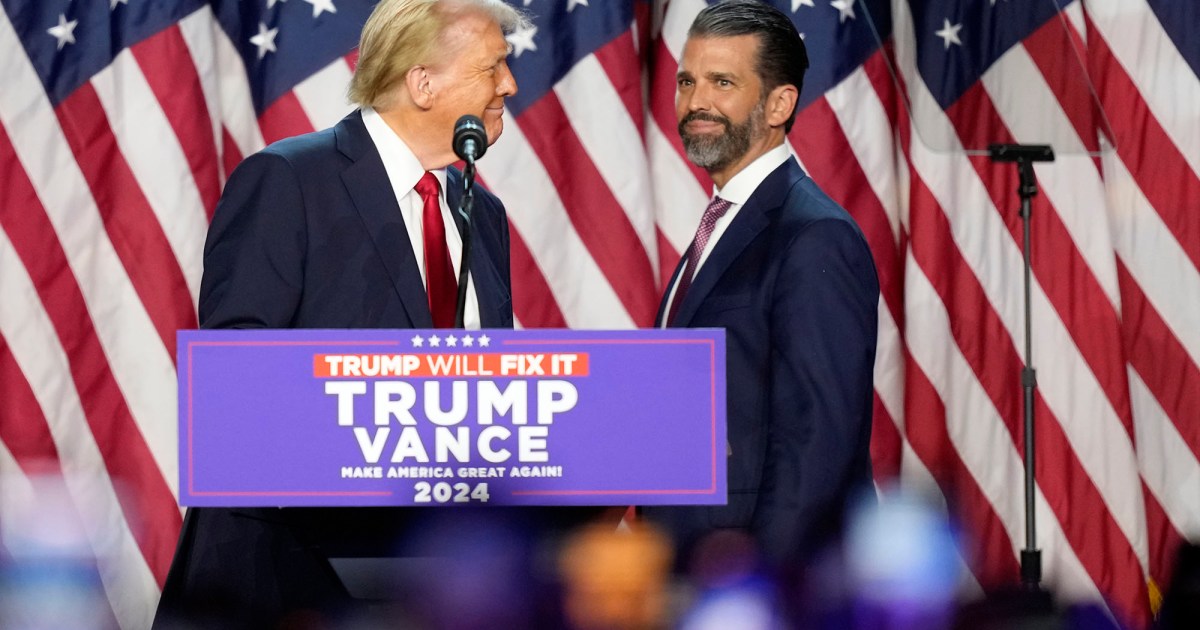
The day after President Joe Biden ended his presidential campaign on July 21, Vice President Kamala Harris arrived in Delaware to greet her new campaign staff. She had worked the phones the previous day, and with Biden’s endorsement, was already the presumptive nominee. The campaign would remain intact—there was no time to build a new one from scratch. But there would be tweaks. One was already audible when she strode to the podium to Beyoncé’s 2016 anthem “Freedom.” The megastar had given Harris the go-ahead to use it as the campaign’s new theme song just hours before.
Harris closed her remarks to staff with a question. “Do we believe in freedom?” she said. “Do we believe in opportunity? Do we believe in the promise of America?” The audience clapped and Beyoncé’s chorus returned. Freedom, freedom I can’t move. Freedom cut me loose.
It was the start of a rapid rebranding of the Democratic campaign just over three months before the election on November 5. That message shift has taken center stage in Chicago. Whereas Biden’s campaign had settled on a message of protecting American democracy against the threat of Donald Trump’s return, the Harris campaign has chosen to elevate the word freedom. In some ways they are synonyms, their venn diagram circles overlapping. But as a campaign slogan, the shift is key to understanding Harris’ pitch to voters. Americans are about to hear the word a lot. If she wins, it may prove a very savvy decision.
The abortion rights movement increasingly rebranded its work as a fight for freedom. The term “pro-choice” receded and phrases like “reproductive freedom” took its place.
On Tuesday afternoon, in one of the conventions’ massive conference rooms, a couple dozen delegates attended a training session on how to most effectively speak to voters about abortion and reproductive health. “We are reclaiming the word freedom and we are running on freedom,” Gabby Richards, Planned Parenthood’s director of federal advocacy communications, explained to the crowd. A slide displayed on two large screens read: “Message Imperative #1: Focus on Freedom.” “This issue is not just about whether or not someone has the ability to access abortion. It’s about whether or not someone has the ability and the freedom to decide when, if, and how they become a parent.”
The Supreme Court’s decision two years ago in Dobbs v. Jackson Women’s Health Organization to take away the right to abortion set the stage for a campaign focused on the idea of liberation. The abortion rights movement increasingly rebranded its work as a fight for freedom. The term “pro-choice” receded and phrases like “reproductive freedom” took its place. “Pre-Dobbs decision, we had been testing a lot of frames around reproductive justice, and while freedom was a strong frame, it was not really the strongest,” explains Roshni Nedungadi, founding partner of HIT Strategies, a polling and research firm focused on young voters, voters of color, and women voters. “But post-Dobbs, we’ve seen really just an increase in people leaning into this idea that they should have the freedom to make choices for themselves and the freedom to live their lives to the fullest extent possible, and that is really resonating with a huge swath of the public. I think it’s really smart of the campaign to start using this phrase.” (Nedungadi’s partner at HIT Strategies, Terrance Woodbury, joined the Harris campaign earlier this month.)
The idea of freedom is flexible, and the frame extends beyond abortion, contraception, and in vitro fertilization. Harris had been playing with the idea of freedom in her speeches when she was still running for vice president and campaigning for Joe Biden, a key difference between her speeches on the campaign trail and his. In the Harris campaign’s first video, a few days after her pep talk to the staff in Delaware, Harris was already leaning further into the new messaging. “We choose freedom,” she says in the video, cuing the chorus to Beyonce’s song. “The freedom not just to get by, but get ahead. The freedom to be safe from gun violence. The freedom to make decisions about your own body.”
By the third night in Chicago, freedom was the central theme. Gov. Josh Shapiro of Pennsylvania gave a version of the 2022 stump speech he used to defeat a MAGA Republican: “It’s not freedom to tell our children what books they’re allowed to read,” he said in his reprisal Wednesday night. “It sure as hell isn’t freedom to say he can go vote but he gets to pick the winner.”
“Protecting democracy, that frame doesn’t work as well for young people and for communities of color who feel that democracy has never done anything for them,” says Nedungadi.
Shapiro’s framing of freedom as both part of our everyday lives and integral to our elections is key to understanding how this rebrand is suddenly working for Democrats. Biden spent years warning about the threat Trump posed to democracy. “Whether we keep our republic is now in your hands,” Biden said in his Oval Office address about ending his campaign. All this is true, but as a campaign message it’s proved inaccessible to many voters—the same voters whose lack of support was dragging down Biden’s campaign.
“Protecting democracy, that frame doesn’t work as well for young people and for communities of color who feel that democracy has never done anything for them,” says Nedungadi. “Every time we are in focus groups with those folks, and we try to talk about defending democracy, restoring democracy, we hear back from them with no prompting: But what has democracy done for me? This system isn’t working for me. They point to the Electoral College and the idea that Hillary Clinton can win the popular vote but not be President of the United States. And they say, What do you mean defend democracy? It’s clearly broken.”
Biden’s focus on democracy had also proved hard to grasp. The work of connecting democracy to abortion was like writing a term paper, whereas freedom easily connects them. It also failed to inspire. As the voters in Nedungadi’s focus groups pointed out, it was a message of backward preservation rather than progress. “I’ve been excited about giving folks something to hope for,” says Nourbese Flint, president of All* Above All Action Fund, which works toward both abortion rights and political power for communities of color. “The conversation around freedom, the conversation around our futures, is something that I welcome because it does give people something to fight for rather than against.”
Polling now shows the Harris campaign surging, largely by pulling these same voters back into supporting the Democratic nominee. The campaign also hopes that the word freedom has more cross-party appeal. It’s language that has been associated with Republicans, most recently during George W. Bush’s administration. In the wake of 9/11, Bush described freedom as under attack, and it became both a rallying cry and an expression of partisan support for Bush. If you called them freedom fries, you were definitely a Republican.
In a recent New York Times report, Democratic officials stressed that the campaign was reclaiming appeals to liberty. And there is a taste of that in the campaign’s rhetoric, embodied most specifically in the mantras now associated with Vice Presidential nominee Tim Walz. “There’s a golden rule,” he says on the stump, “mind your own damn business!” He calls out Republicans for sending the government into private spaces like the bedroom and the doctor’s office. This is what political theorists call negative liberty, the idea that freedom exists in the absence of restriction.
But Walz is actually an ambassador of a much more expansive view of freedom, or positive liberty. The idea that freedom is found in the preconditions to opportunity. In his address to the convention Wednesday night, Walz not only asked the government to leave people alone but also praised a vision of America in which neighbors look out for each other and housing and health care are rights—that’s not an absence of government but a major role for it. It’s a political tradition with a long history. In 1941, Roosevelt combined these two sides of the liberty coin when he called for freedom of speech, freedom of worship, freedom from want, and freedom from fear.
The Harris-Walz campaign is calling for many more freedoms. So many, in fact, that in the final months of the campaign the word could lose all sense of meaning. In a video that aired on the third night, voters spoke directly to the camera about what freedom means to them, from “choice” to “the ability to laugh with friends.” By the end of the video, the narrative thread about freedom had been buried in platitudes. The final freedom was “the freedom to work together.”
There are also a few freedoms that are conspicuously absent. The uncommitted delegates urging an end to the war in Gaza and a large portion of the Democratic base would appreciate freedom from bombing, war, and genocide included on the list.
The freedom argument is “a way for Americans to identify with the scope of things that the Harris campaign wants to do” and “a larger context for us to think about what’s really at stake in the election,” says Guy Cecil, a Democratic strategist. “So freedom involves saving democracy. Freedom involves protecting reproductive rights. Freedom involves making sure the Project 2025 agenda against LGBTQ people isn’t enacted.”
In a tally of phrases uttered in Chicago this week, Project 2025 is near the top of the list. There have been multiple panels explaining it, training people how to talk about it, and speeches warning against it. On Wednesday, Saturday Night Live star Kenan Thompson essentially performed a sketch outlining how it would strip away everything from the right to abortion care to the Department of Education. In Project 2025, the Heritage Foundation and Trump’s allies handed Democrats the perfect foil. Instead of near-abstract concepts about descending into authoritarianism or fascism, as a conversation around democracy necessitates, the Harris campaign can simply compare the freedoms she wants to augment with the ones Project 2025 seeks to claw back.
“They gave us, frankly, a gift,” says Cecil. “They should be in-kinding Project 2025 as a campaign contribution, because I think it’s the starkest contrast that anyone can make between what vision of America we want and what vision of America they want to shove down our throats.”
The mood in Chicago is confident, even electric. The vibe is of a party that has not only found a better candidate but with her a better message. The test of both is what comes next.















